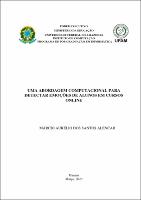| ???jsp.display-item.social.title??? |


|
Please use this identifier to cite or link to this item:
https://tede.ufam.edu.br/handle/tede/8149| ???metadata.dc.type???: | Tese |
| Title: | Uma abordagem computacional para detectar emoções de alunos em cursos online |
| ???metadata.dc.creator???: | Alencar, Márcio Aurélio dos Santos  |
| ???metadata.dc.contributor.advisor1???: | Magalhães Netto, José Francisco de |
| ???metadata.dc.contributor.referee1???: | Barreto, Raimundo da Silva |
| ???metadata.dc.contributor.referee2???: | Nakamura, Fabíola Guerra |
| ???metadata.dc.contributor.referee3???: | Pio, José Luiz de Souza |
| ???metadata.dc.contributor.referee4???: | Menezes, Crediné Silva de |
| ???metadata.dc.description.resumo???: | A cada ano aumenta o número de instituições de ensino que utilizam Ambientes Virtuais de Aprendizagem no ensino a distância. Esses Ambientes Virtuais de Aprendizagem geram um grande volume de informações, de suma importância para essas instituições, assim como para os professores, e com essas informações podemos identificar várias emoções dos estudantes, como frustração, isolamento, desânimo e desmotivação, e por meio de técnicas de Inteligência Artificial é possível estimular e motivar os estudantes. A afetividade é um grande "aliado" para promover a aprendizagem, e para promover a afetividade em ambientes virtuais de aprendizagem é necessário que as ações de interatividade do mediador sejam mais constantes, estando presentes e atentas ao “movimento” dos alunos, buscando ajudá-los de maneira individual e consciente, dando-lhes feedback, fazendo com que se sintam seguros e ajudando a animá-los. A interação entre pessoas em cursos presenciais obtém excelentes resultados, pois os sentidos ajudam os alunos na execução das atividades, porém em Ambientes Virtuais de Aprendizagem essa percepção é diferente e precisa ser estimulada. Dessa forma, essa Tese descreve um modelo para identificação automática de emoções em textos produzidos por estudantes da modalidade Educação a Distância em Ambientes Virtuais de Aprendizagem – AVAs. A abordagem proposta nesse trabalho permite identificar o sentimento contido em mensagens textuais de estudantes de cursos a distância utilizando algoritmo de classificação automática usando análise de sentimentos baseado em abordagem léxica. Os principais resultados obtidos foram no sentido de que a abordagem proposta (léxica, a partir de Análise de Sentimentos) pode colaborar positivamente para o processo de ensino-aprendizagem, tendo em vista que saber o estado emocional dos estudantes pode melhorar no acompanhamento da turma, pois com essas informações adicionais o tutor tem mais um recurso para tomada de decisões, como reconhecer alunos com insatisfação e falta de interesse no curso. Como limitação da pesquisa, temos: subjetividade nos textos, produção de textos grandes, tamanho da amostra, tempo de classificação. |
| Abstract: | Each year the number of educational institutions that use Virtual Learning Environments in distance learning increases. These Virtual Learning Environments generate a large volume of information and are of utmost importance for the institution, as well as for teachers, and with this information, we can identify various students’ emotions, such as frustration, isolation, discouragement, and demotivation, and through techniques of Artificial Intelligence it is possible to stimulate and motivate students. Affection is a great "ally" to promote learning and affection in virtual learning environments, the mediator's interactive actions must be more constant, being present and attentive to the students' "movement", seeking to help them individually and consciously, giving them feedback, making them feel safe and helping to cheer them up. The interaction between people in face-to-face courses obtains excellent results, as the senses help students in the execution of activities, however, in Virtual Learning Environments this perception is different and needs to be stimulated. Thus, this Thesis describes a model for automatic identification of emotions in texts produced by students of Distance Education in Virtual Learning Environments - VLEs. The approach proposed in this work allows to identify the sentiment contained in text messages of students of distance courses using automatic classification algorithm using sentiment analysis based on lexical approach. The main results obtained were that the proposed approach (lexical, based on Sentiment Analysis) can contribute positively to the teaching-learning process, considering that knowing the emotional state of the students can improve the monitoring of the class, because, with this additional information, the tutor has one more resource for decision makings, such as recognizing students with dissatisfaction and lack of interest in the course. Finally, as a limitation of the research, we have: subjectivity in the texts, production of large texts, sample size, classification time. |
| Keywords: | Ambientes virtuais compartilhados Inteligência artificial - Aplicações educacionais Realidade virtual na educação Afetividade Ensino à distância |
| ???metadata.dc.subject.cnpq???: | CIÊNCIAS EXATAS E DA TERRA |
| ???metadata.dc.subject.user???: | Análise de Sentimentos Computação Afetiva Ambiente Virtual de Aprendizagem Sistema Multiagente |
| Language: | por |
| ???metadata.dc.publisher.country???: | Brasil |
| Publisher: | Universidade Federal do Amazonas |
| ???metadata.dc.publisher.initials???: | UFAM |
| ???metadata.dc.publisher.department???: | Instituto de Computação |
| ???metadata.dc.publisher.program???: | Programa de Pós-graduação em Informática |
| Citation: | Alencar, Márcio Aurélio dos Santos. Uma abordagem computacional para detectar emoções de alunos em cursos online. 2020. 126 f. Tese (Doutorado em Informática) - Universidade Federal do Amazonas, Manaus, 2020. |
| ???metadata.dc.rights???: | Acesso Aberto |
| URI: | https://tede.ufam.edu.br/handle/tede/8149 |
| Issue Date: | 25-Mar-2020 |
| Appears in Collections: | Doutorado em Informática |
Files in This Item:
| File | Description | Size | Format | |
|---|---|---|---|---|
| Tese_MárcioAlencar_PPGI.pdf | Tese_MárcioAlencar_PPGI | 3.19 MB | Adobe PDF |  Download/Open Preview |
Items in DSpace are protected by copyright, with all rights reserved, unless otherwise indicated.




